
This photo taken on Dec. 26, 2024 shows whale fossil remains at Wadi Al-Hitan, or the Whale Valley, in Fayoum, Egypt. Wadi Al-Hitan, or the Whale Valley, located in the desert of Fayoum, features invaluable fossil remains of the earliest, and now extinct, suborder of whales, Archaeoceti.
It was designated a United Nations Educational, Scientific and Cultural Organization (UNESCO) World Heritage Site in 2005. (Xinhua/Sui Xiankai)
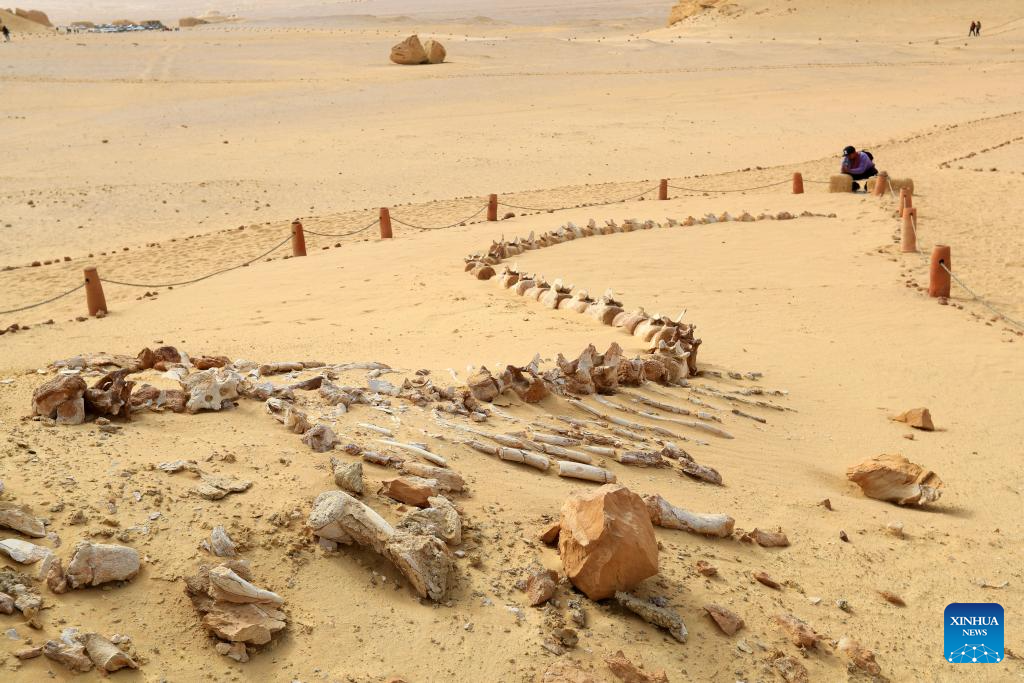
This photo taken on Dec. 26, 2024 shows whale fossil remains at Wadi Al-Hitan, or the Whale Valley, in Fayoum, Egypt. Wadi Al-Hitan, or the Whale Valley, located in the desert of Fayoum, features invaluable fossil remains of the earliest, and now extinct, suborder of whales, Archaeoceti.
It was designated a United Nations Educational, Scientific and Cultural Organization (UNESCO) World Heritage Site in 2005. (Xinhua/Sui Xiankai)
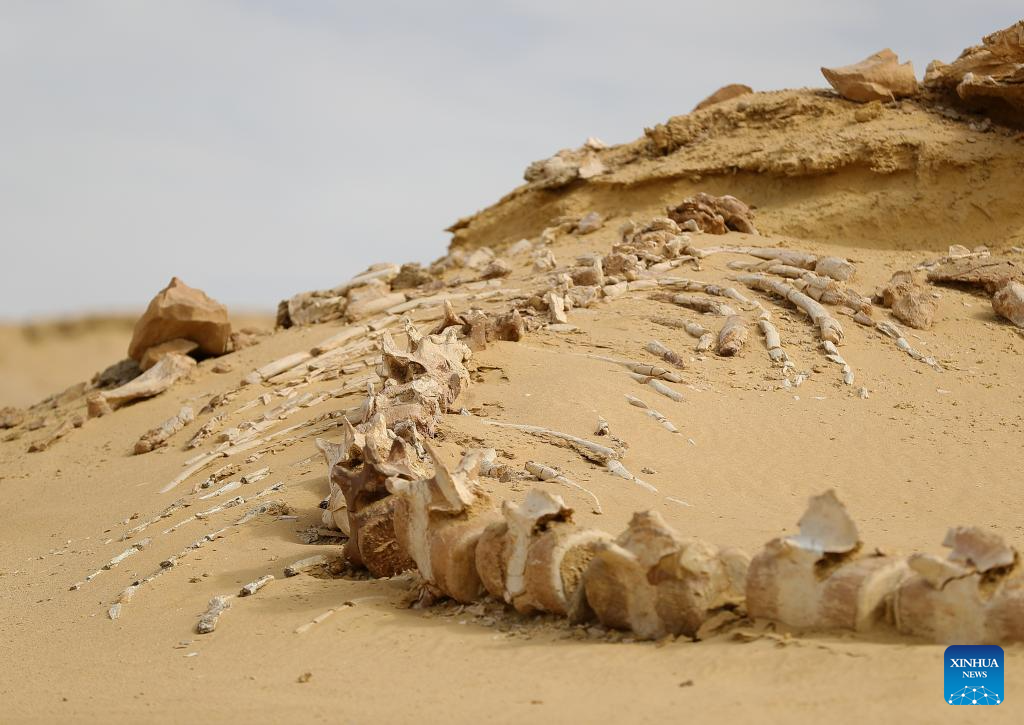
This photo taken on Dec. 26, 2024 shows whale fossil remains at Wadi Al-Hitan, or the Whale Valley, in Fayoum, Egypt. Wadi Al-Hitan, or the Whale Valley, located in the desert of Fayoum, features invaluable fossil remains of the earliest, and now extinct, suborder of whales, Archaeoceti.
It was designated a United Nations Educational, Scientific and Cultural Organization (UNESCO) World Heritage Site in 2005. (Xinhua/Wang Dongzhen)

Tourists view whale fossil remains at Wadi Al-Hitan, or the Whale Valley, in Fayoum, Egypt, on Dec. 26, 2024. Wadi Al-Hitan, or the Whale Valley, located in the desert of Fayoum, features invaluable fossil remains of the earliest, and now extinct, suborder of whales, Archaeoceti.
It was designated a United Nations Educational, Scientific and Cultural Organization (UNESCO) World Heritage Site in 2005. (Xinhua/Sui Xiankai)
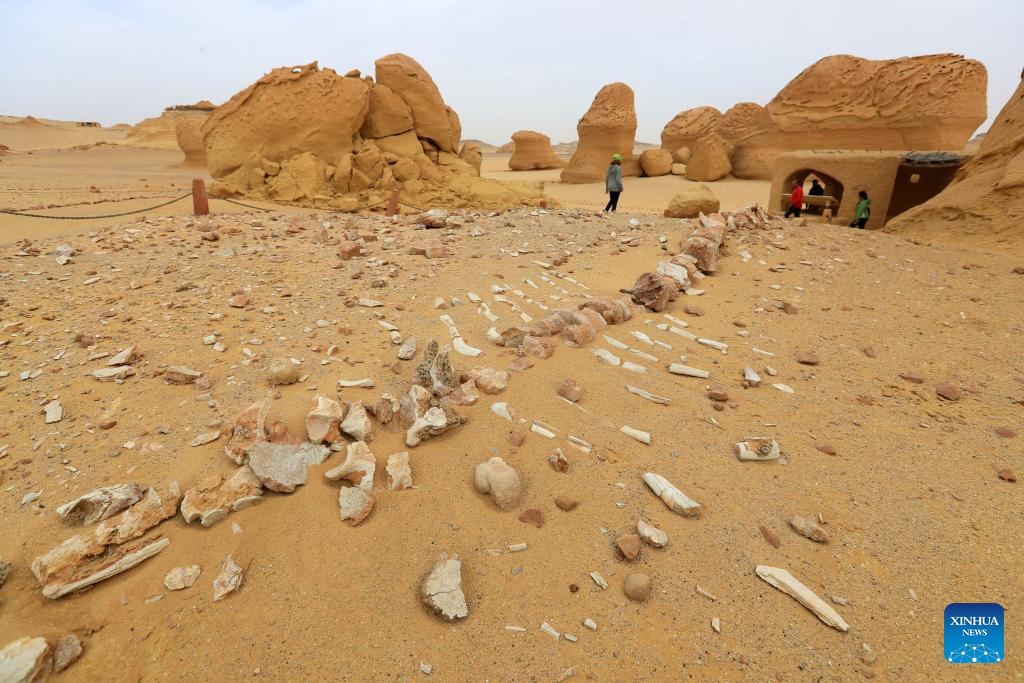
This photo taken on Dec. 26, 2024 shows whale fossil remains at Wadi Al-Hitan, or the Whale Valley, in Fayoum, Egypt. Wadi Al-Hitan, or the Whale Valley, located in the desert of Fayoum, features invaluable fossil remains of the earliest, and now extinct, suborder of whales, Archaeoceti.
It was designated a United Nations Educational, Scientific and Cultural Organization (UNESCO) World Heritage Site in 2005. (Xinhua/Sui Xiankai)

Tourists visit Wadi Al-Hitan, or the Whale Valley, in Fayoum, Egypt, on Dec. 26, 2024. Wadi Al-Hitan, or the Whale Valley, located in the desert of Fayoum, features invaluable fossil remains of the earliest, and now extinct, suborder of whales, Archaeoceti.
It was designated a United Nations Educational, Scientific and Cultural Organization (UNESCO) World Heritage Site in 2005. (Xinhua/Wang Dongzhen)
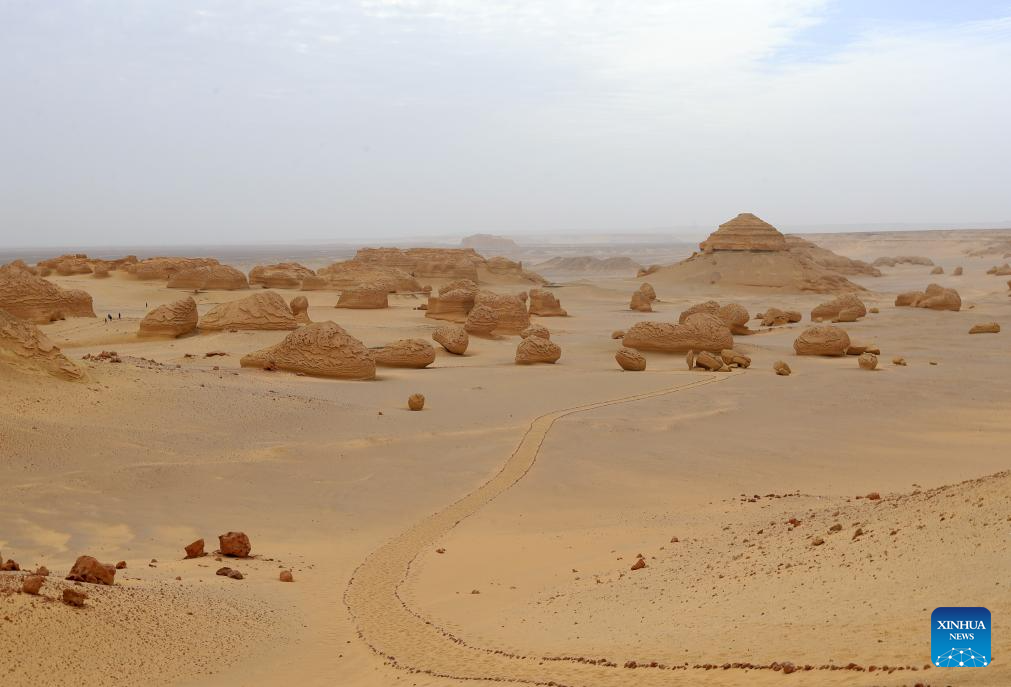
This photo taken on Dec. 26, 2024 shows a view of Wadi Al-Hitan, or the Whale Valley, in Fayoum, Egypt. Wadi Al-Hitan, or the Whale Valley, located in the desert of Fayoum, features invaluable fossil remains of the earliest, and now extinct, suborder of whales, Archaeoceti.
It was designated a United Nations Educational, Scientific and Cultural Organization (UNESCO) World Heritage Site in 2005. (Xinhua/Sui Xiankai)
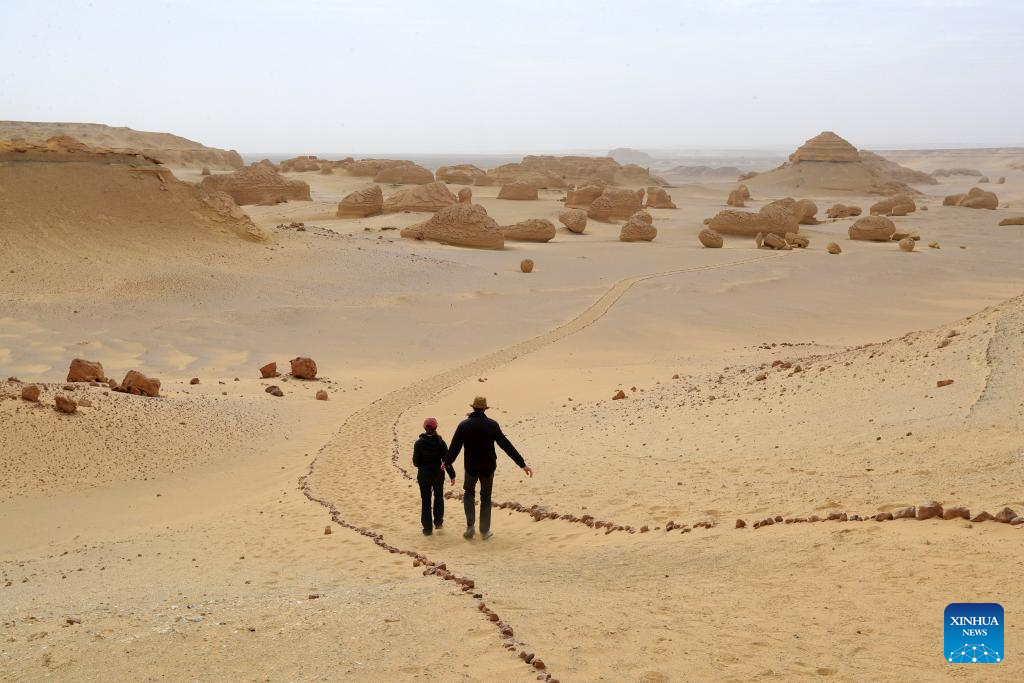
Tourists visit Wadi Al-Hitan, or the Whale Valley, in Fayoum, Egypt, on Dec. 26, 2024. Wadi Al-Hitan, or the Whale Valley, located in the desert of Fayoum, features invaluable fossil remains of the earliest, and now extinct, suborder of whales, Archaeoceti.
It was designated a United Nations Educational, Scientific and Cultural Organization (UNESCO) World Heritage Site in 2005. (Xinhua/Sui Xiankai)

This photo taken on Dec. 26, 2024 shows whale fossil remains at Wadi Al-Hitan, or the Whale Valley, in Fayoum, Egypt. Wadi Al-Hitan, or the Whale Valley, located in the desert of Fayoum, features invaluable fossil remains of the earliest, and now extinct, suborder of whales, Archaeoceti.
It was designated a United Nations Educational, Scientific and Cultural Organization (UNESCO) World Heritage Site in 2005. (Xinhua/Sui Xiankai)
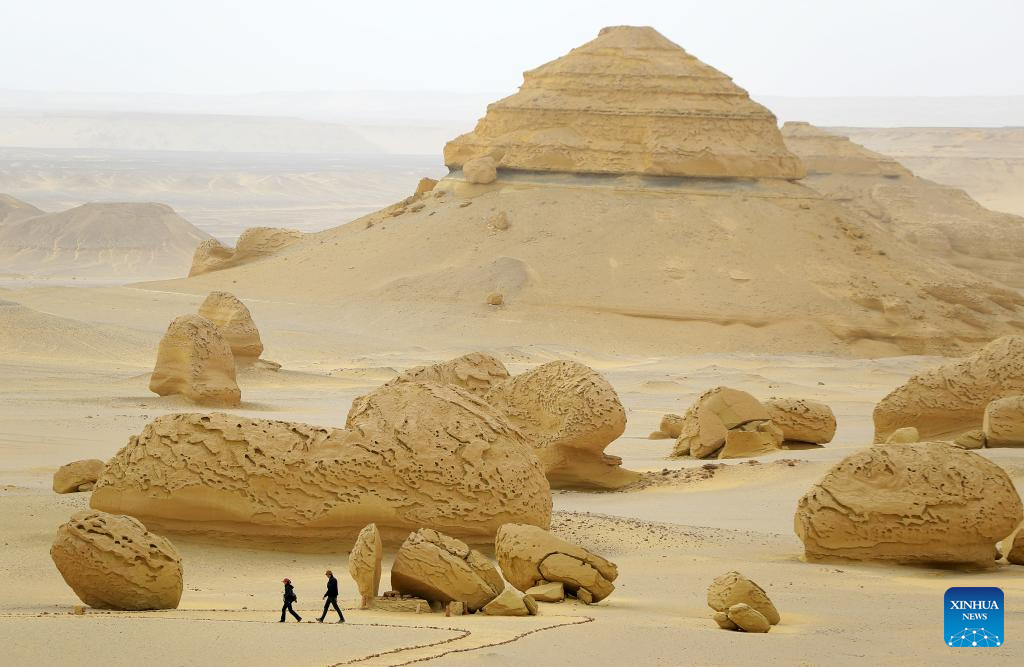
Tourists visit Wadi Al-Hitan, or the Whale Valley, in Fayoum, Egypt, on Dec. 26, 2024. Wadi Al-Hitan, or the Whale Valley, located in the desert of Fayoum, features invaluable fossil remains of the earliest, and now extinct, suborder of whales, Archaeoceti.
It was designated a United Nations Educational, Scientific and Cultural Organization (UNESCO) World Heritage Site in 2005. (Xinhua/Wang Dongzhen)

This photo taken on Dec. 26, 2024 shows whale fossil remains at Wadi Al-Hitan, or the Whale Valley, in Fayoum, Egypt. Wadi Al-Hitan, or the Whale Valley, located in the desert of Fayoum, features invaluable fossil remains of the earliest, and now extinct, suborder of whales, Archaeoceti.
It was designated a United Nations Educational, Scientific and Cultural Organization (UNESCO) World Heritage Site in 2005. (Xinhua/Sui Xiankai)
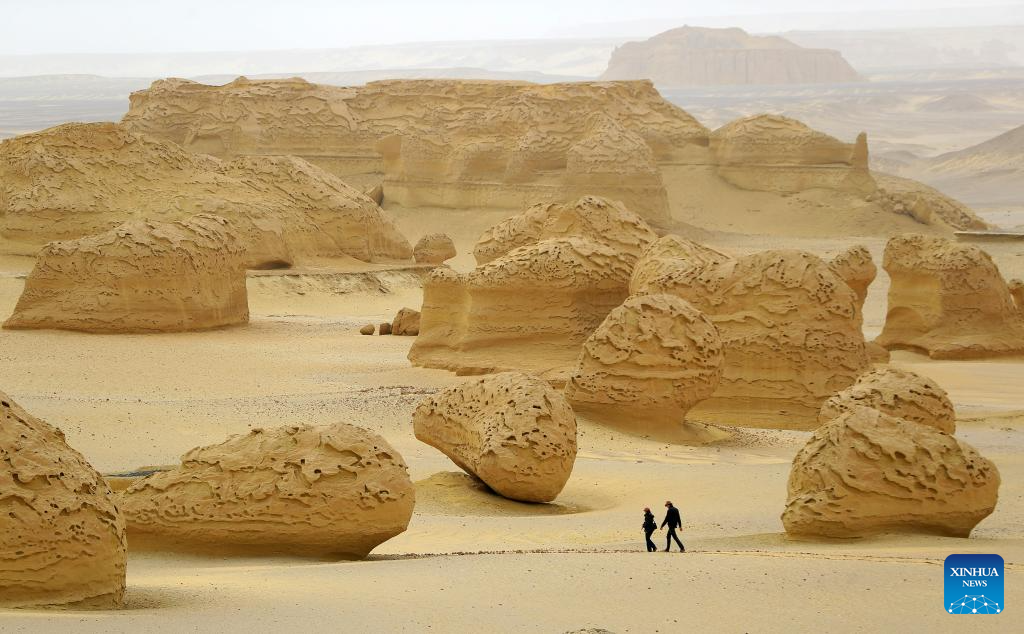
Tourists visit Wadi Al-Hitan, or the Whale Valley, in Fayoum, Egypt, on Dec. 26, 2024. Wadi Al-Hitan, or the Whale Valley, located in the desert of Fayoum, features invaluable fossil remains of the earliest, and now extinct, suborder of whales, Archaeoceti.
It was designated a United Nations Educational, Scientific and Cultural Organization (UNESCO) World Heritage Site in 2005. (Xinhua/Wang Dongzhen)

This photo taken on Dec. 26, 2024 shows whale fossil remains at Wadi Al-Hitan, or the Whale Valley, in Fayoum, Egypt. Wadi Al-Hitan, or the Whale Valley, located in the desert of Fayoum, features invaluable fossil remains of the earliest, and now extinct, suborder of whales, Archaeoceti.
It was designated a United Nations Educational, Scientific and Cultural Organization (UNESCO) World Heritage Site in 2005. (Xinhua/Sui Xiankai)

This photo taken on Dec. 26, 2024 shows whale fossil remains at Wadi Al-Hitan, or the Whale Valley, in Fayoum, Egypt. Wadi Al-Hitan, or the Whale Valley, located in the desert of Fayoum, features invaluable fossil remains of the earliest, and now extinct, suborder of whales, Archaeoceti.
It was designated a United Nations Educational, Scientific and Cultural Organization (UNESCO) World Heritage Site in 2005. (Xinhua/Sui Xiankai)

Tourists visit Wadi Al-Hitan, or the Whale Valley, in Fayoum, Egypt, on Dec. 26, 2024. Wadi Al-Hitan, or the Whale Valley, located in the desert of Fayoum, features invaluable fossil remains of the earliest, and now extinct, suborder of whales, Archaeoceti.
It was designated a United Nations Educational, Scientific and Cultural Organization (UNESCO) World Heritage Site in 2005. (Xinhua/Wang Dongzhen)
